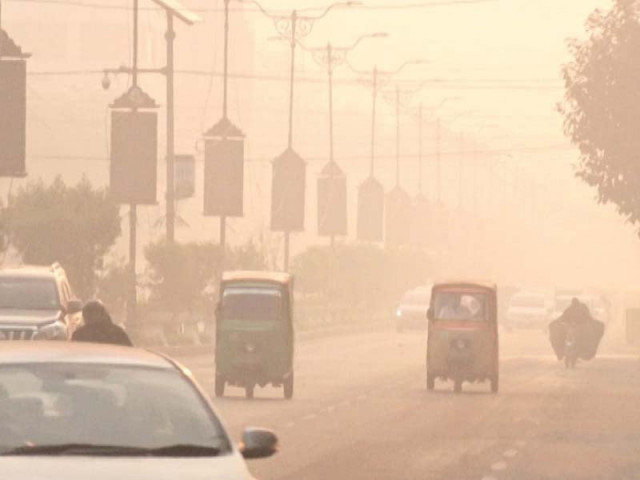WWF urges PM to declare smog emergency
Lahore continues to rank among the world's most polluted cities

As toxic smog spreads across several cities in Punjab, with Lahore consistently ranking among the world's top three most polluted cities, WWF-Pakistan has urged Prime Minister Shehbaz Sharif to declare a "national emergency" to address this growing crisis.
In a letter addressed to the PM who is also the Pakistan Climate Change Council chairperson, the WWF- Pakistan noted that smog has reduced air quality to hazardous levels, posing a threat to public health, economy and environment.
Inaction on this issue, it said, will exacerbate the current crisis, and lead to further health complications, economic losses and environmental degradation".
The letter outlined immediate and long-term measures to control the smog crisis, which has engulfed several cities across the country and urged the PM to issue necessary orders to immediately remove high-emission vehicles from the roads to curb the current crisis.
It called for the immediate closure of polluting industries and emphasized the need to extend the regulations of the "Green Lockdown" to other areas of Lahore and to other highly-polluted cities.
It also called for halting construction activities during the peak of the smog season, including the closure of brick kilns. The letter said the WWF-Pakistan and its associated team of environmental experts have been closely monitoring the situation, its causes, and its impact, and previously published a comprehensive set of recommendations to address the issue before it reached its current, critical state.
"With the onset of the autumn season, smog has become the most pervasive environmental and health concern for the citizens of Pakistan," it added.
According to the letter, the WWF in collaboration with the IQAir Foundation is currently operating the largest network of low-cost air quality monitoring devices in the country, covering 15 cities.
"These devices have repeatedly reported AQI levels exceeding 1,000 in several cities in Punjab, with particulate matter regularly surpassing WHO guidelines by 30-40 times."
Commenting on the smog issue, WWF-Pakistan Director General Hammad Naqi Khansaid said the government must take immediate, bold and decisive actions to address this emergency.
He said the worsening air quality and persistent smog is a serious issue not only for the people and the environment, but also for the economy. He appreciated the government's efforts to tackle the smog issue, but stressed on the implementation of stricter actions in letter and spirit.
"In the long run, there is a need to promote electric vehicles, enhance sustainable development models, segregate industrial zones, expand the mass transit network and switch to renewable energy sources."
Proposing long-term measures, WWF-Pakistan recommended transition to Euro V or Euro VI fuel quality standards and accelerate the adoption of electric vehicles (EVs) in Pakistan, especially two and three-wheelers, to significantly reduce vehicular emissions.
It also stressed on the expansion of the public transport network in metropolitan centres, and urged the government to scale green financing, subsidizing alternatives to burning of crop residue.
"Low-cost air quality sensors measure pollutants like PM1.0, PM2.5, NO2, SO2, and O3 and can help identify pollution hotspots across the country.
"WWF-Pakistan strongly recommends the widespread use of these sensors to monitor air quality to inform smog-control measures. The urgency of the situation cannot be overstated, as it directly impacts the health of millions of Pakistanis," the letter stated.
Meanwhile, in Lahore, the air quality index has reached dangerously high levels, keeping the city at the top of the list of the world's most polluted cities.
The highest air quality index recorded in Lahore was 2591, with readings of 2188 at Syed Maratib Ali Road, 2155 at Pakistan Engineering Services, and 1704 at Ghazi Road Interchange. The average air quality index in Lahore stands at 1460.



















COMMENTS
Comments are moderated and generally will be posted if they are on-topic and not abusive.
For more information, please see our Comments FAQ